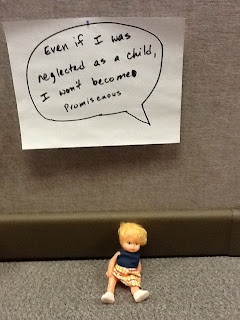I work with some non-traditional colleagues. But I adore every one of them. It sure makes going to work more enjoyable.
Earlier, another colleague did a presentation about our program entitled: Top 10 ways to injure yourself or your loved ones. It included information like
1. "Stuff your baby’s crib with soft, fluffy pillows.
• 2/3 of Utah infants who died of SIDS were sleeping in a bed inconsistent national recommendations."
2. Leave your baby alone with your boyfriend. More than half of child homicides result from injuries due to abuse. The biological father or boyfriend of the mother are most often the perpetrators.
3. Who says Grandma doesn’t need all those rugs laying around? Falls are the:#1 cause of injury-related hospitalization and emergency department visits #1 cause of traumatic brain injuries.
4. Take a bunch of pain pills and call us in the morning. Starting in 2006, more Utahns died from poisoning than from car crashes each year.
5. Have your family reunion right next to a stream or pond. Two common drowning scenarios in Utah are:
• Toddlers (ages 1-4) wandering off during a weekend family gathering – with several adults present – and falls into a pool, stream, pond, river, etc.
• Teens swimming with friends at a lake (aka “dumb boy stunts”). Many are “witnessed” drownings, where friends or family members see the victim go under the water and are unable to rescue them.
6. If you ain’t tough enough to take it, don’t play!
• Half (49.5%) of all ED visits for sports/recreation-related concussions in Utah are among children age 10-19.
• Even “getting your bell rung” can be serious. If your brain doesn’t have time to heal, a second – even mild – concussion can be fatal.
7. Belittle, control, and abuse your significant other. If you think abuse is someone else’s problem, think again.
• More than 3,400 men, women, and children entered shelters in FY 10 to escape domestic violence.
8. Strive to obtain as many Adverse Childhood Experiences (ACEs) as possible. ACEs include verbal, physical, or sexual abuse and family dysfunction (e.g., incarcerated, mentally ill, or substance abusing family member; domestic violence; or absence of a parent because of divorce or separation).
In fairness, she did warn them:
*Disclaimer: When you deal with some of the topics we do, you quickly lose all sense of moral boundaries. It’s a coping mechanism. We’re disturbed. We know it.
Please don’t be offended….



i love us! (:
ReplyDelete